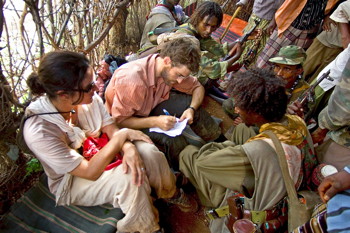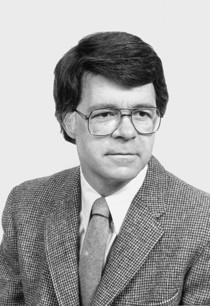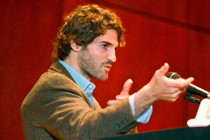END NOTE
A professor's lasting impact

Jeffrey Gettleman '94 covers a rebellion in the Ogaden desert of Ethiopia for The New York Times. Photo provided by The New York Times. See larger image
I entered Cornell in the fall of 1989 as a prospective history major, but Henry Shue soon changed that.
Professor Shue (that's what I called him then and that's what still feels right now, despite graduating nearly 20 years ago and him constantly telling me these days, "Dammit, Jeffrey, call me Henry!") taught a popular class called Ethics and Public Life. Shue is a philosopher, and philosophy often gets very abstract and very dry. But Shue's goal was to break down complicated moral theories into practical guidance for life – or at least to formulate the important questions. How much do we owe our children and their generation (which gets at environmental policy)? How much should the rich give to the poor? When is it right to go to war?

Former Cornell philosophy professor Henry Shue, now a senior research fellow at Oxford University. See larger image
Of all the things I studied at Cornell, I found these to be the most engaging questions I encountered and the ones that have stayed with me for the rest of my life. I didn't know it at the time, of course, but the work I'm doing now, living in Africa and writing about some of the poorest and most violent places on Earth, centers on issues of inequality and injustice. I feel like I'm on the frontlines of moral philosophy every day.
I soon came to see Shue not just as a teacher but as a role model. He has a built-in empathy for others, and he's deeply vexed by moral issues, constantly asking himself what he can do to make the world a better place and how to focus his academic work to generate the most practical impact. I went on to take a number of classes with him and to major in philosophy. He became my adviser and was the one who encouraged me to apply for a Marshall Scholarship, which I won. That scholarship saved my life because I have no idea what I would have done after Cornell if I hadn't had two years of relatively cushy graduate school to figure it out.
No doubt, Shue has enjoyed a brilliant academic career, from his early days as a Rhodes scholar, to his Princeton Ph.D., to serving as the director of Cornell's Ethics and Public Life program. He's such a stud in the moral philosophy world that some high-powered scholars recently did a book about his ground-breaking book, "Basic Rights," which was published in 1980 with a very '80s font on the cover and raised pressing questions about the responsibilities of rich nations to poor ones. Shue is also blessed with a keen sense of direction. I visit him every year or so at Oxford, where he is a senior research fellow at Merton College, and I have seen this human compass at work many, many times, most recently reading a map of a Cotswold footpath upside down and in the rain.

Jeffrey Gettleman '94 speaks at Cornell during a 2004 visit to campus. See larger image
But of all his enviable qualities, what I admire most about Henry (see, I eventually follow directions) is that he is unfailingly humble and one of the least judgmental people I know. I used to walk into his class a hung-over 19-year-old with a dirty Ohio State baseball cap on backward and greasy locks hanging out. But he didn't care. He enthusiastically engaged students who took an interest in his teachings and would treat us all as colleagues with valid arguments. He seemed to really enjoy the back and forth, and he wanted to know our ideas.
I had many great professors at Cornell whom I care about, but no one seemed to take as deep an interest in me as a person as Henry, and I'm a better man for it.
Jeffrey Gettleman '94 is the East Africa bureau chief for The New York Times. He won a Pulitzer Prize this year for his reporting from Somalia and Sudan.